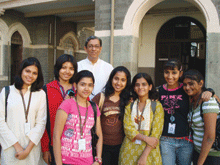A promising proposal initiated three years ago and formally presented last year to the Union HRD ministry to sanction the establishment of an apex-level Xavier University of India, affiliating 22 of the country's most highly-ranked undergrad colleges and 15 research institutions, has not elicited any response from the UPA government in Delhi. Dilip Thakore investigates
 It’s a prize-winner idea, a leap of the imagination, mind-boggling in its implications, and certain to enthuse every reformer of India’s faltering education system. Yet a proposal initiated three years ago and formally presented last March to the Union human resource development ministry to sanction the establishment of an apex-level Xavier University of India, affiliating 22 of the country’s most well-reputed undergrad colleges and 15 research institutions, has not elicited any response from the ministry or the Congress-led UPA government in New Delhi.
It’s a prize-winner idea, a leap of the imagination, mind-boggling in its implications, and certain to enthuse every reformer of India’s faltering education system. Yet a proposal initiated three years ago and formally presented last March to the Union human resource development ministry to sanction the establishment of an apex-level Xavier University of India, affiliating 22 of the country’s most well-reputed undergrad colleges and 15 research institutions, has not elicited any response from the ministry or the Congress-led UPA government in New Delhi.
Now with the UPA’s five year term in office drawing to a close and a general election imminent this summer, red lights are flashing in the usually placid offices of the Provincial, South Asia Assistancy, New Delhi and in the offices of 18 provincials countrywide of the Society of Jesus, aka the Jesuit Conference of India, which has mooted this proposal. Although Jesuit educationists put on a brave face and say that the Xavier University proposal has bipartisan support, there is sudden fear that the Congress-led UPA government may be replaced in New Delhi by a new coalition headed by the minorities-bashing Bharatiya Janata Party (BJP), which could result in this ambitious proposal being locked away in deep cold storage.
The case for Central government recognition and approval of the proposed Xavier Central University of India was advanced in a detailed letter dated March 12, 2008, by Dr. (Fr.) Hector D’Souza, president of the Jesuit Conference of India (JCI) and provincial of the South Asia Assistancy, which supervises education dispensed in 155 Jesuit schools and 31 colleges in India, with an aggregate enrollment of over 100,000 students.
Referring to Article 30(1) of the Constitution of India which bestows a fundamental right on all religious and linguistic minorities to establish and administer education institutions of their choice, the JCI letter says: “In our present application we request that this university be recognised and minority rights be granted to us, to establish and administer a centrally funded minority central Jesuit University. On examining the request one may raise the question whether the constitutional right to establish an ‘institution’ can also be applied to the establishment of a university. Whether this has been done earlier or not will not have legal force (sic). Rather the question to examine is whether there is any constitutional impediment for applying that right to be extended to establish a university, since the (proposed) university is also an institution, even though it may have multiple campuses.”
Since then for almost one year the JCI letter hasn’t elicited a reply, despite Dr. D’Souza and JCI educationists reportedly having followed up the application proposal consistently. Likewise half-hearted e-mail enquiries (because despite this publication having been in print for eight years, the Union HRD ministry has never acknowledged its existence) made by EducationWorld to Union HRD minister Arjun Singh and D. Purandeshwari, minister of state, about the status of the JCI application, (as anticipated) failed to get any response.
 Nevertheless Dr. D’Souza remains as convinced as ever that the promotion of a centrally funded Xavier University of India is very much in the public interest, as it can contribute substantially towards raising higher education standards — especially arts, science and commerce education — in India. “Given that Jesuit institu-tions dominate most league tables of India’s best colleges, a Jesuit university affiliating all of them would sharply raise standards of higher education in India. Currently all our colleges and research institutions operate independently of each other across the country. If we could draw upon the brightest and best faculty and scholars from among them to conduct deep research in the proposed Xavier University, they could develop new bodies of knowledge and perhaps write a new education agenda based on our core values of equality and social justice,” says D’Souza (see interview).
Nevertheless Dr. D’Souza remains as convinced as ever that the promotion of a centrally funded Xavier University of India is very much in the public interest, as it can contribute substantially towards raising higher education standards — especially arts, science and commerce education — in India. “Given that Jesuit institu-tions dominate most league tables of India’s best colleges, a Jesuit university affiliating all of them would sharply raise standards of higher education in India. Currently all our colleges and research institutions operate independently of each other across the country. If we could draw upon the brightest and best faculty and scholars from among them to conduct deep research in the proposed Xavier University, they could develop new bodies of knowledge and perhaps write a new education agenda based on our core values of equality and social justice,” says D’Souza (see interview).
This argument enumerating the beneficial impact upon the public interest if the UPA government clears the application of the JCI, is echoed by Dr. (Fr.) Ambrose Pinto, a political science graduate and Ph D of Mangalore University, former director of the Indian Social Institute, Delhi (1998-2001), and currently principal of Bangalore’s showpiece St. Joseph’s College which offers arts and science undergraduate and postgrad education to 2,500 students instructed by a faculty of 150, “80 percent of whom are Ph Ds”.
 “Although Jesuit colleges are renowned for the quality of undergra-duate education they provide, and dominate the league tables of India’s best colleges published by India Today and other publications, they have not attained world class status due to lack of exposure to world class laboratories and research. The proposed Xavier University of India will not only combine the synergies of India’s most respected colleges, but will also have access to the 26 Jesuit universities in the US and 18 in Europe with whom they can establish strong faculty, student, knowledge and research exchange linkages. Moreover the proposed Xavier University will be a completely apolitical institution promoted and administered by educationists, and will surely become a powerhouse of advanced research and a model university for the country,” says Pinto.
“Although Jesuit colleges are renowned for the quality of undergra-duate education they provide, and dominate the league tables of India’s best colleges published by India Today and other publications, they have not attained world class status due to lack of exposure to world class laboratories and research. The proposed Xavier University of India will not only combine the synergies of India’s most respected colleges, but will also have access to the 26 Jesuit universities in the US and 18 in Europe with whom they can establish strong faculty, student, knowledge and research exchange linkages. Moreover the proposed Xavier University will be a completely apolitical institution promoted and administered by educationists, and will surely become a powerhouse of advanced research and a model university for the country,” says Pinto.
Yet the sticking point of this proposal, initially described as an “exciting idea” by ailing septuagenarian HRD minister Arjun Singh and which is presumably giving him pause, is that the proposition is attached with the rider that the proposed Xavier University should be centrally funded — albeit to the modest extent of Rs.75 crore per year. Currently most Jesuit colleges across the country are partially funded by state governments. Thus St. Xavier’s, Mumbai receives an annual grant of Rs.5.5 crore from the Maharashtra state government which covers the salaries and remuneration of the college’s faculty and other employees. Likewise St. Joseph’s College, Bangalore receives a state government grant of Rs.3 crore and Loyola College, Chennai Rs.4.44 crore per year. The JCI proposal to establish the Xavier University of India (which will be sited in the NCR (national capital region) contiguous to Delhi) is conditional upon the new university being “a centrally funded minority Central Jesuit University”.
To facilitate this proposal, JCI has recommended that the Union government withhold the salary grant amounts which the 22 Jesuit colleges proposed to be affiliated to the new university receive from state govern-ments, from the annual tax revenue transfers from the Centre to the states (as per the formula prescribed by the States Finance Commissions from time to time). The aggregate amount thus withheld could be disbursed annually to the proposed Xavier University for distribution among its affiliated colleges.
.gif) Although this proposal does not impose any additional burden on the states or the Union government, requiring mere book entries for adjustment of accounts, some bureaucrats within the Union HRD ministry are reportedly making heavy weather of it. According to reports emanating from Shastri Bhavan, Delhi which houses the HRD ministry, several timorous bureaucrats have raised the bogey of angry state governments opposing a centrally funded Xavier University, arguments which are making HRD minister Arjun Singh hesitant about endorsing it on the eve of a general election. Singh reportedly fears that clearance of the proposal will prompt the opposition BJP — which is viscerally opposed to “western values” allegedly propagated by Christian missionary education institutions — to make an election issue of the Congress party’s “minority appeasement” policies.
Although this proposal does not impose any additional burden on the states or the Union government, requiring mere book entries for adjustment of accounts, some bureaucrats within the Union HRD ministry are reportedly making heavy weather of it. According to reports emanating from Shastri Bhavan, Delhi which houses the HRD ministry, several timorous bureaucrats have raised the bogey of angry state governments opposing a centrally funded Xavier University, arguments which are making HRD minister Arjun Singh hesitant about endorsing it on the eve of a general election. Singh reportedly fears that clearance of the proposal will prompt the opposition BJP — which is viscerally opposed to “western values” allegedly propagated by Christian missionary education institutions — to make an election issue of the Congress party’s “minority appeasement” policies.
Such fear — if at all it is being entertained within the HRD ministry — is unfounded because right across the country there is a discernible groundswell in favour of Christian missionary or ‘convent’ education, which is (correctly) perceived to be more enabling than the low-quality education being provided in the country’s 900,000 government primaries and 76,000 secondaries. Certainly within the country’s 350 million-strong aspirational and influential middle class, the idea of a high-quality, globally benchmarked Xavier University of India providing very affordable higher education through its highly-rated affiliated colleges, is likely to be warmly welcomed.
Moreover it is pertinent to bear in mind that some of the iconic heroes of the great Indian middle class including Nobel Laureate Rabindranath Tagore, former president Dr. A.P.J. Kalam, nuclear scientist Dr. Raja Ramanna, former West Bengal chief minister Jyoti Basu, Union home minister P. Chidambram, BJP spokesperson Arun Jaitley, author Arvind Adiga and cricketers Sunil Gavaskar, Sourav Ganguly and Rahul Dravid are all graduates of Jesuit colleges. This broad mix of alumni cutting across political, religious and vocational boundaries prompts some Jesuit educationists to believe that the Xavier University proposal will receive all-party support in Parliament.
Nevertheless resistance to the proposal from some state-level politicians is inevitable, even though there is no financial loss to state governments if the approval comes through. That’s because local politicians will surely lose the limited power to influence student admissions, faculty appointments and patronage, which they enjoy currently. But they can be converted with the argument that the higher standards of the proposed Xavier University will release superior quality graduates into the management and professional pools of the states, thus contributing towards improving their industrial and agricultural productivity.
Apart from raising the bogey of upsetting Centre-state relations, naysayers to the Jesuit Conference proposal also argue that although Article 30(1) of the Constitution confers a fundamental right on religious minorities to “establish and administer educational institutions of their choice”, there is no obligation upon the Central government to fund them, as proposed. Nor is there a precedent for recognising a multi-campus nationwide conglomeration of colleges as an ‘institution’. The institutions promoted by the Central government in post-independence India such as the six IITs (Indian Institutes of Technology) and the seven IIMs (Indian Institutes of Management) across the country have been single-campus institutions, which have conspicuously not been accorded the status of universities.
But as indicated earlier, the JCI proposal for establishing a Xavier University of India does not require any additional funding from the Union government. In tacit acknowledgment of Jesuit colleges keeping tuition fees affordable, almost all state governments have been paying their salary bills. All that JCI is asking for is that the subsidies conferred by state governments be paid to the proposed university and the amounts be deducted from each state’s annual tax receipts from the Centre, requiring a mere book-keeping adjustment. Moreover given that all the colleges proposed to be affiliated to the new university are highly rated (grade A and above) by the National Assessment and Accreditation Council (NAAC — a subsidiary of the University Grants Commission), they have considerable potential to raise additional resources by offering self-financing professional courses and undertaking commissioned research projects from industry.
Nor it there much substance in the argument that there is no precedent for government recognition of a multi-campus university as an “educational institution” under Article 30 (1) of the Constitution, which confers the right to “establish and administer educational institutions of their choice” upon all linguistic and religious minorities. For one, ordinary interpretation of the words “educational institutions” includes universities because it strains the imagination to describe a university as anything other than an educational institution. And since Article 30 doesn’t specifically exclude minorities from promoting universities, elementary principles of judicial interpretation dictate that universities should be included within the ambit of the words “educational institutions”.
Moreover of late, judges of the Supreme Court having taken judicial cognisance of the mess that heavy-handed government micro-management has made of tertiary education, tend to be more sympathetic of private initiatives in higher education. For instance in a landmark judgement delivered in 2002 in T.M.A. Pai Foundation vs. Union of India (2002 8 SCC 481), a full-bench of the apex court ruled that private unaided (financially independent) institutions of higher education have the right to determine their own admission procedures subject to their being based on merit, and to determine their own tuition fees provided they are “reasonable” and rationally calculated.
Despite the Central and state governments’ best efforts to sabotage the implementation of this judgement, its ratio decidendi was upheld three years later in P.A. Inamdar vs. State of Maharashtra (Appeal (Civil) 5041 of 2005). Therefore if the Xavier University of India application goes to the Supreme Court, the JCI schema is likely to be upheld as falling four square within the ambit of Article 30(1). According to sources within JCI, a legal opinion to this effect has been obtained from renowned senior Supreme Court advocate Fali Nariman.
 Against the backdrop of government vacillation on this win-win proposal to establish a unique world class university — by virtue of the A plus grading given to its affiliated colleges by NAAC — it’s hardly surprising that a note of exasperation is detectable in the comments of usually patient Jesuit academics. “The promotion of a Central government backed Jesuit university is self-evidently a proposal in the public interest, as it will blend academics with skills-based training, and provide a new thrust to Indian education. The proposal for the Xavier University of India affiliating all Jesuit colleges across the country was made to the Union HRD ministry three years ago, but the government is yet to take a decision in this regard. If the UPA government is at all keen on improving higher education in this country, it should clear this proposal during its current term in office,” says Dr. (Fr.) S. Ignacimuthu, former principal of Chennai’s Loyola College, vice-chancellor of Bharatiar (Coimbatore) and Madras universities and currently director of the Entomology Research Centre of Loyola College, Chennai.
Against the backdrop of government vacillation on this win-win proposal to establish a unique world class university — by virtue of the A plus grading given to its affiliated colleges by NAAC — it’s hardly surprising that a note of exasperation is detectable in the comments of usually patient Jesuit academics. “The promotion of a Central government backed Jesuit university is self-evidently a proposal in the public interest, as it will blend academics with skills-based training, and provide a new thrust to Indian education. The proposal for the Xavier University of India affiliating all Jesuit colleges across the country was made to the Union HRD ministry three years ago, but the government is yet to take a decision in this regard. If the UPA government is at all keen on improving higher education in this country, it should clear this proposal during its current term in office,” says Dr. (Fr.) S. Ignacimuthu, former principal of Chennai’s Loyola College, vice-chancellor of Bharatiar (Coimbatore) and Madras universities and currently director of the Entomology Research Centre of Loyola College, Chennai.
Regretably despite the obvious merits of the proposal and bona fides of Jesuit educationists, the auguries are not good. Veteran educationists heading Jesuit colleges across the country are receiving less than a sympathetic ear for modest proposals to upgrade their institutions.
 Although it hosts seven research institutes and nine centres of excellence and has established a Loyola Development Office to mobilise resources from alumni and philanthropists to upgrade its infrastructure and expand research activity, the management of Chennai’s Loyola College (estb.1925), rated A + by NAAC and ranked India’s premier arts and science college by India Today last year (2008), is experiencing state government resistance to transform into a deemed university. “The stumbling block is the salary aid grant given by the state government for 100 faculty — one-third of our faculty strength. If the state government guarantees the grant-in-aid and pays the salaries and retirement benefits of our aided staff — which it is reluctant to do — the college can seriously explore the idea of transforming into a degrees-awarding university in its own right,” says Dr. Albert Muthumalai, an alumnus of De Nobili College (Pune), Vidya Jyoti (Delhi) and Madras University, who is currently principal of Loyola.
Although it hosts seven research institutes and nine centres of excellence and has established a Loyola Development Office to mobilise resources from alumni and philanthropists to upgrade its infrastructure and expand research activity, the management of Chennai’s Loyola College (estb.1925), rated A + by NAAC and ranked India’s premier arts and science college by India Today last year (2008), is experiencing state government resistance to transform into a deemed university. “The stumbling block is the salary aid grant given by the state government for 100 faculty — one-third of our faculty strength. If the state government guarantees the grant-in-aid and pays the salaries and retirement benefits of our aided staff — which it is reluctant to do — the college can seriously explore the idea of transforming into a degrees-awarding university in its own right,” says Dr. Albert Muthumalai, an alumnus of De Nobili College (Pune), Vidya Jyoti (Delhi) and Madras University, who is currently principal of Loyola.
 Similarly, Mumbai’s highly rated (A+) St. Xavier’s College (estb. 1869) which has an enrollment of 4,500 students and is routinely ranked among the country’s top 10 arts and science colleges in India Today’s annual surveys, is facing hurdles in extracting autonomous status — which is routinely awarded to most vintage Jesuit colleges by their affiliating universities — from Mumbai University. “Although we applied 18 months ago, we have not yet been awarded autonomous status which will enable us to devise our own syllabuses and curriculums. Currently our efforts to raise teaching-learning standards are curtailed by the uniform standards that Mumbai University prescribes for its 550 affiliated colleges. If, instead, we are granted affiliation with the proposed Xavier University of India, we will immediately improve our academic and research standards,” comments Dr. (Fr.) Frazer Mascarenhas, an alum of Mumbai and Pune universities and currently principal of Mumbai’s most famous arts and science college.
Similarly, Mumbai’s highly rated (A+) St. Xavier’s College (estb. 1869) which has an enrollment of 4,500 students and is routinely ranked among the country’s top 10 arts and science colleges in India Today’s annual surveys, is facing hurdles in extracting autonomous status — which is routinely awarded to most vintage Jesuit colleges by their affiliating universities — from Mumbai University. “Although we applied 18 months ago, we have not yet been awarded autonomous status which will enable us to devise our own syllabuses and curriculums. Currently our efforts to raise teaching-learning standards are curtailed by the uniform standards that Mumbai University prescribes for its 550 affiliated colleges. If, instead, we are granted affiliation with the proposed Xavier University of India, we will immediately improve our academic and research standards,” comments Dr. (Fr.) Frazer Mascarenhas, an alum of Mumbai and Pune universities and currently principal of Mumbai’s most famous arts and science college.
With state governments unwilling to make even small concessions to these time-honoured Jesuit institutions, spreading pessimism within the ranks of the usually cheerful and optimistic leaders of the Jesuit Conference of India is understandable. Yet the self-evident merit of the Xavier University of India proposal is beginning to enthuse highly influential shapers of public opinion.
.gif) “I think it’s a great idea to affiliate India’s excellent and well-reputed Jesuit colleges with a Xavier University of India. Indeed as we have recommended in our higher education reform proposals to the prime minister, India needs to triple the number of its universities from 431 currently to over 1,500 within the next five years. In this context the proposed boutique university affiliating excellent undergrad colleges, offers a good model for future expansion of higher education. The idea of an apex-level university drawing upon the best faculty and students from affiliated colleges to do high-end research and knowledge creation deserves the support of all right-thinking people,” says Satyen (‘Sam’) Pitroda the iconic chairman of the National Knowledge Commission which was established in 2005 by prime minister Manmohan Singh to draw up an education development road-map for the country. Widely respected as the author and architect of India’s astonishing telecom revolution of the 1990s, which has multiplied the number of telephone connections from 25 million to 300 million within a decade, under Pitroda’s chairmanship NKC has made over 300 detailed education reform recommendations to the UPA government, most of which have been ignored.
“I think it’s a great idea to affiliate India’s excellent and well-reputed Jesuit colleges with a Xavier University of India. Indeed as we have recommended in our higher education reform proposals to the prime minister, India needs to triple the number of its universities from 431 currently to over 1,500 within the next five years. In this context the proposed boutique university affiliating excellent undergrad colleges, offers a good model for future expansion of higher education. The idea of an apex-level university drawing upon the best faculty and students from affiliated colleges to do high-end research and knowledge creation deserves the support of all right-thinking people,” says Satyen (‘Sam’) Pitroda the iconic chairman of the National Knowledge Commission which was established in 2005 by prime minister Manmohan Singh to draw up an education development road-map for the country. Widely respected as the author and architect of India’s astonishing telecom revolution of the 1990s, which has multiplied the number of telephone connections from 25 million to 300 million within a decade, under Pitroda’s chairmanship NKC has made over 300 detailed education reform recommendations to the UPA government, most of which have been ignored.
.gif) Likewise Dr. Parth Shah former professor of economics at Michigan University, USA and currently the founder chairman of the Centre for Civil Society, Delhi, is enthusiastic about almost two dozen of India’s top colleges “connecting under the brand of an apex university which will also be well connected with numerous universities around the world”. “The present university system in India is very rigid and inflexible. It doesn’t give students a choice to mix and match their subjects. Its defining characteristic is narrow specialisation, decreed by administrators who believe they know what’s best for everyone. The consequence is that Indian universities produce technicians and specialists who are seldom well-rounded, truly educated graduates. Therefore there’s an urgent need for a new type of university which is connected with higher education institutions around the world and qualified to devise new syllabuses and curriculums,” says Shah.
Likewise Dr. Parth Shah former professor of economics at Michigan University, USA and currently the founder chairman of the Centre for Civil Society, Delhi, is enthusiastic about almost two dozen of India’s top colleges “connecting under the brand of an apex university which will also be well connected with numerous universities around the world”. “The present university system in India is very rigid and inflexible. It doesn’t give students a choice to mix and match their subjects. Its defining characteristic is narrow specialisation, decreed by administrators who believe they know what’s best for everyone. The consequence is that Indian universities produce technicians and specialists who are seldom well-rounded, truly educated graduates. Therefore there’s an urgent need for a new type of university which is connected with higher education institutions around the world and qualified to devise new syllabuses and curriculums,” says Shah.
Quite clearly with tertiary education — especially undergraduate arts and science education — in the doldrums (according to a McKinsey World Institute study conducted in 2005, 85 percent graduates of India’s 15,000 arts and science colleges are unemployable), the proposal to establish a Xavier University of India affiliating prime Jesuit colleges under one banner, requires urgent clearance.
Perceived impediments such as salary grants of the 22 Jesuit colleges scattered countrywide, and the imminent general election are not as big a deal as they are made out to be. Given that during the Eleventh Plan period (2007-12) a massive outlay of Rs.12,100 crore has been proposed for higher education, the proposed Rs.75 crore per year requested by JCI to be adjusted in Centre-state accounts is peanuts.
On the contrary in the cause of upgrading university research and curriculum development standards, the Union government should make a suo motu grant of Rs.75 crore to the proposed university, leaving state government grants to its affiliated colleges intact. Simultaneously even though the last session of Parliament is over, the Xavier University of India can be approved by a Union cabinet resolution followed by a UGC order or government ordinance to that effect.
Before it lays down the seals of office this summer, the Congress-led UPA government, which has failed to fulfill its promise of raising the annual outlay for education to 6 percent of GDP, has a last chance to make a memorable impact on Indian education by clearing the Xavier University of India proposal. Futherance of the public interest demands it.
With Hemalatha Raghupathi (Chennai); Harshikaa Udasi (Mumbai) & Autar Nehru (Delhi)